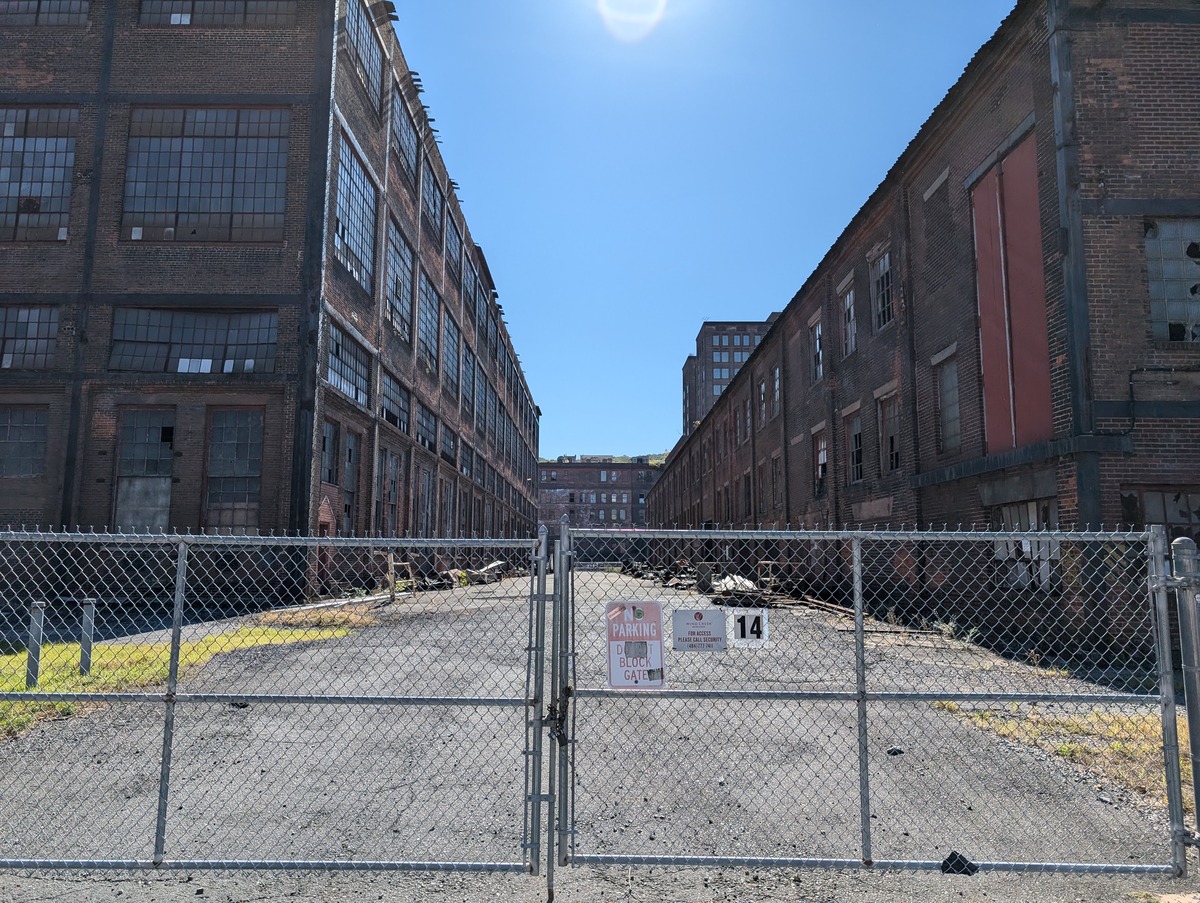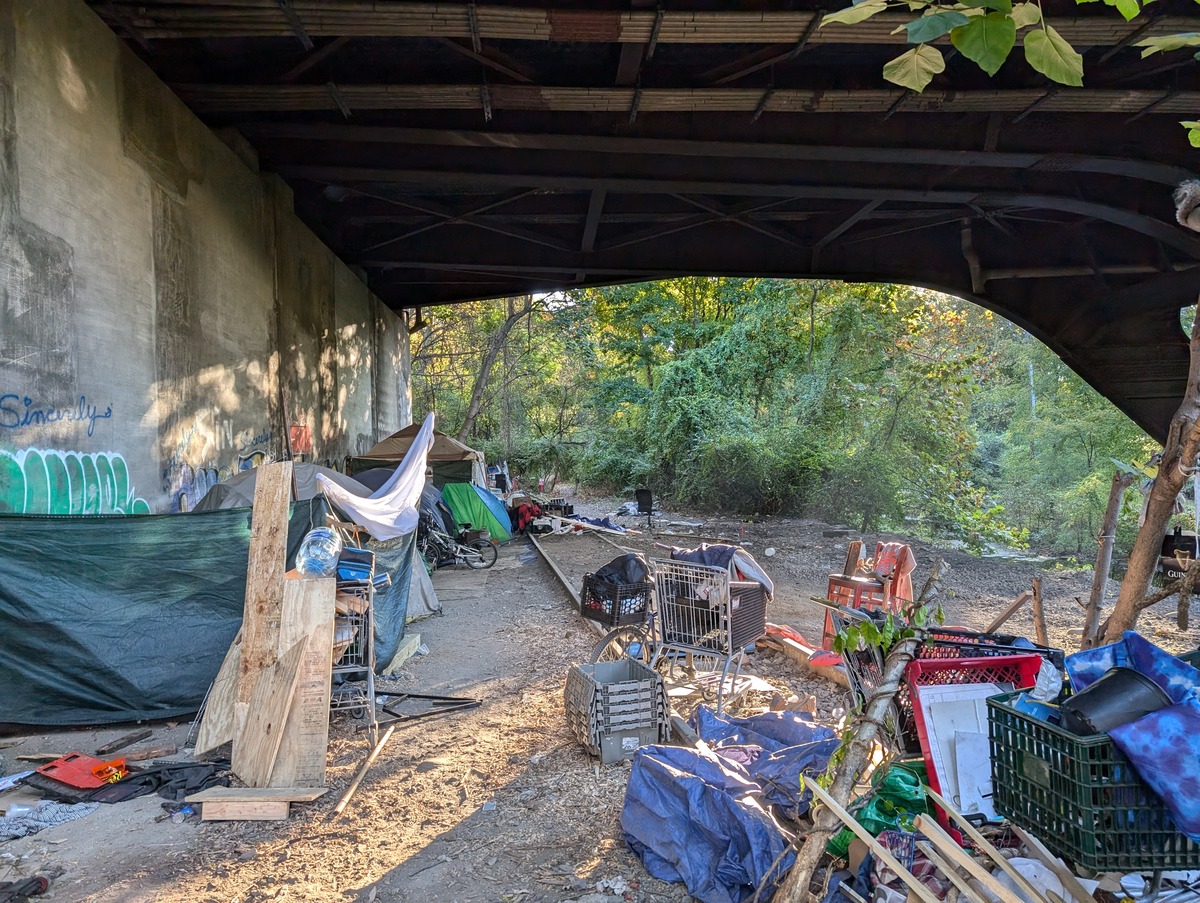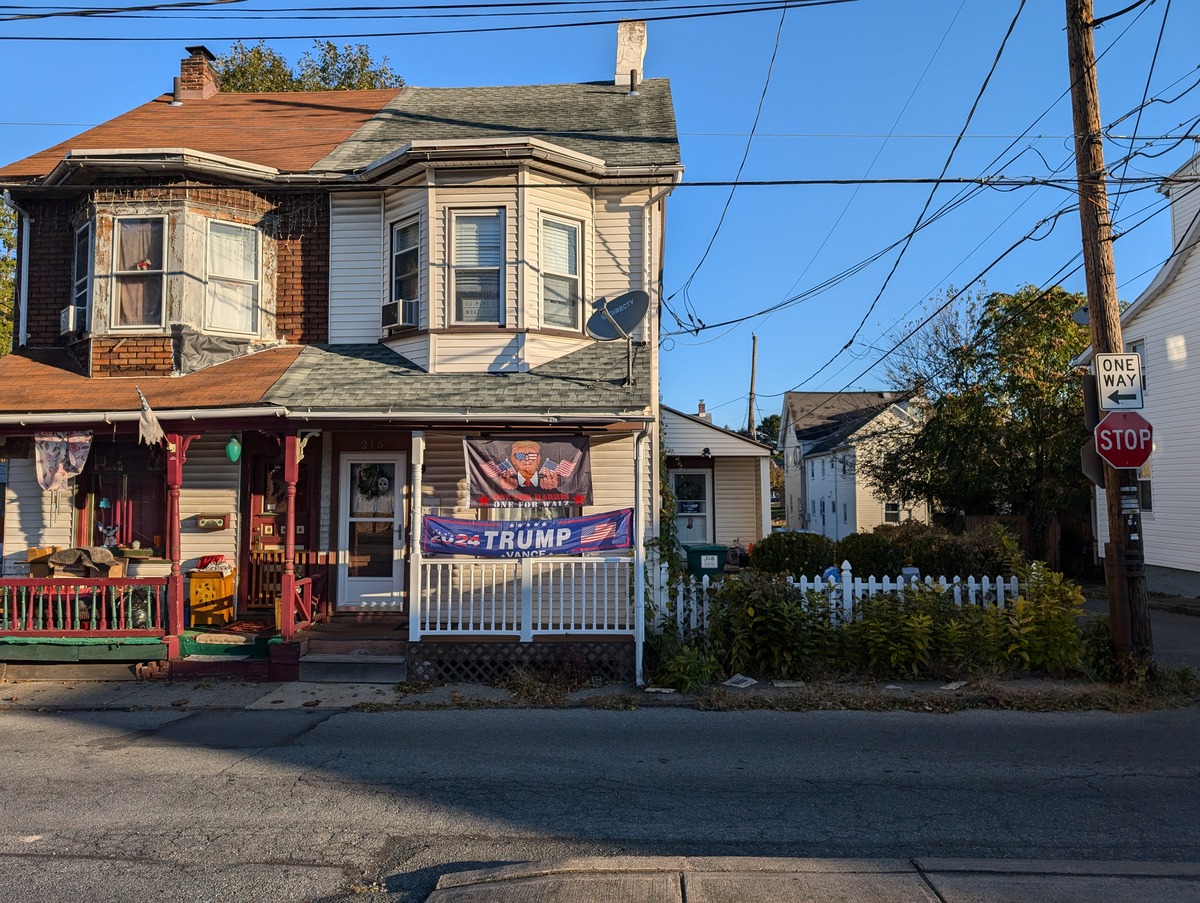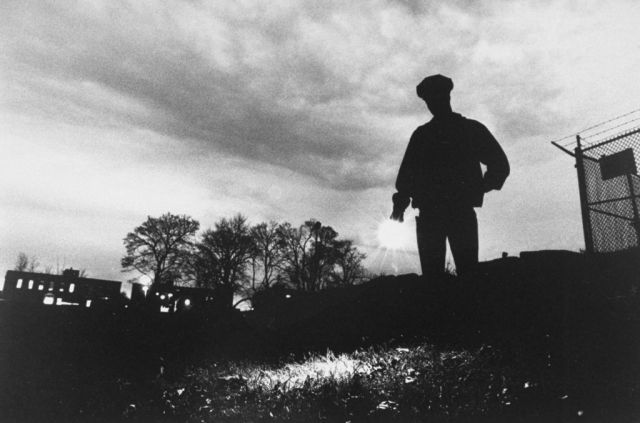The Bethlehem fringes are unforgiving. (Photo by Steve Liss/Getty)

It was just before 2.30am, on a crisp Tuesday morning, when Tyrell Holmes was set on fire. Few were awake to hear his shrieks. By the time the police arrived, Holmes had collapsed dead, his corpse smouldering next to a dumpster.
The autopsy determined that he had been stabbed several times, then covered in gasoline and burnt alive. Holmes was 18. The day before, in a message posted on Snapchat, he had warned his friends and family that his life was in danger.
“Alkhion Dunkins, Yzire Jenkins-Row and Zahmire Welcome,” he wrote. “If something happens to me, know those three.”
***
Half a century earlier, the writer Joan Didion had travelled to San Francisco to report on the “social haemorrhaging” of Sixties America. She wanted to bear witness to a nation’s decay and reveal its impact on a disoriented youth. These children, she wrote, “drifted from city to torn city, sloughing off both the past and the future as snakes shed their skins”; these children “were never taught and would never now learn the games that had held the society together”.
On San Francisco’s streets she found a generation numbed by narcotics and ideological incoherence: a youth no longer in revolt — but in stupor. “It was not a country in open revolution,” she wrote in her essay, Slouching Towards Bethlehem. “It was not a country under enemy siege. It was the United States of America.”
That was 1967. But what of today? If San Francisco once embodied a country collapsing under the weight of its contradictions, where is our Bethlehem?
As the curtain falls on an election campaign defined by its own ideological incoherence, there is no longer one single locus for the nation’s disaffected. For at least a decade, there have been many Bethlehems here: Philadelphia, Oakland, Seattle, San Francisco. And more recently, this “haemorrhaging” has spread to unexpected corners of the country.
Today, one place more than any other embodies this anomie. A rust-belt city that serves as a mirror to the nation. A city in America’s most important battleground state; in a county that has predicted the winner of every US election since 1912 bar three. A city that happens to be called Bethlehem.
***

Here, on the surface at least, the centre appears to be holding. Bethlehem is safely ensconced in Pennsylvania’s portion of the Greater Appalachian Valley, and bisected by the gentle Lehigh River. It oozes college-cute charm. Tim Walz held a rally at one of the city’s high schools back in September and was mocked for admitting “we can’t afford four more years of this”. But in Bethlehem, the gaffe went mostly unnoticed.
Earlier this year, it was awarded Unesco World Heritage Status, and it feels like the city is still celebrating. On Bethlehem’s Main Street, crimson leaves fall to the pavement, where they turn to gold. There is a choir of beautiful churches, an ice cream parlour, two taprooms — one selling beer; the other organic olive oil — and a shop selling Palestinian flags.
At one end, almost out of sight, Donald Trump’s campaign team have set up an office. “The building is owned by a Democrat,” the flag-seller tells me, before shrugging. “I guess money talks.” On the city’s fringes, Trump and Harris yard signs face off against each other, while Democrat billboards flank its entry roads.
True to its name, Bethlehem has always been drawn to the Holy Land. Since 1741, when devout Moravian travellers founded the settlement on 24 December, Christmas has been central to the city’s identity. Within six years, it boasted America’s first decorated Christmas tree. These days, it’s known as the “Christmas City” and, from November onwards, tourists come to worship in the city’s festive gift shops. The most devout get married in the opulent Hotel Bethlehem, where December weddings start at $18,000. “It was perfect,” purrs one Bethlehem bride.
But across the river, the rusted hulk of the city’s former steelworks speaks to a different chapter in the city’s history. If Bethlehem gave America its Christmas spirit, it also built its backbone. The Chrysler Building, Alcatraz Island, the Hoover Dam, the Golden Gate Bridge — all were forged with steel produced in its 16-story blast furnaces. By 1940, roughly 40% of New York City’s skyline was constructed with materials from Bethlehem Steel. Three years later, during the Second World War, its workers constructed the equivalent of one battleship per day. As Walz said during his visit, it was Bethlehem Steel that “freed the world from Nazi oppression”.
Then came the post-war reconstruction, when Japan and Germany rebuilt their own plants, and more efficient steelworks were devised in America. When the global recession hit in the Eighties, Bethlehem Steel’s fate was sealed. It clung on until 1995, when the city’s steelmaking tradition died in one final nostalgic cascade of fire and ore. A worker whistled “Amazing Grace” over a speaker system on the furnace floor, and the steelworks fell silent.
Today, the land is owned by that other great American business: a casino company. Many of the old factory buildings remain empty and fenced off; a handful are occupied by start-ups and event companies. Tucked away at one end is the casino, whose shopping centre, spa and dizzying array of 4,000 betting terminals attract gambler-tourists ferried in and out on coaches from New York’s Chinatown. Britney Spears held a show there in 2018; next month, Engelbert Humperdinck is flying in.
Under the shadow of the five remaining defunct furnaces, I find Tom Sedor, a third-generation steelworker. His family history charts the industry’s decline. Sedor’s grandfather was a blacklisted union man during the First World War. His father was also a union man, until he was killed when a furnace blew up in 1948. Sedor himself worked on the plant’s electrics, right up until Bethlehem Steel closed.

“The hardest part was the Rule of 85,” he explains, where a worker could only retire with a full pension if their age and period of service added up to 85 or more. “Many men had to go to other plants, mostly in Baltimore, and that led to a lot of divorces.”
Sedor, 83, will be voting Democrat, but only because, as a lifelong union man, he could never vote for Trump. “At least Harris has visited Pennsylvania, unlike Hillary Clinton,” he says. But will life get better? “I don’t think so. Take the casino. Yes, it brings jobs, but they’re not well-paid.” He points out that the minimum wage in Pennsylvania is the federal minimum of $7.25 an hour; more than half of the rate in neighbouring New Jersey.
“How is anyone supposed to pay their rent with that?”
***
At the time of his death in April 2018, Tyrell Holmes rented a flat with two of his killers, Alkhion Dunkins and Yzire Jenkins-Row. “Back then, the landlord didn’t care how you made your money,” says one former resident.
On the night of the murder, just after midnight, neighbours heard a fight break out in their third-floor apartment. There was a shriek followed by a crash — and then silence. Holmes had been strangled unconscious. He was then dragged down the stairwell and thrown into an idling car. It quietly drove off.
Today, the block of flats on East Raspberry Street, a short walk from Bethlehem’s centre, is owned by a different letting company, but a handful of its residents remain the same. Elle, 31, has lived in the flat next to Holmes for six years. “I used to let them into the building when they forgot their keys,” she tells me. They played loud music, she says, but “didn’t cause any problems”. On the night itself, Elle and her husband came home just before 3.00am, after closing up a nearby bar. “They were next door, quickly packing up their shit — and then they just left.”
The next day, a forensic team arrived. She never saw the young men again.
“The building is still a piece of shit,” Elle adds. “They don’t fix anything.” But at least the rent is relatively cheap: it costs $1,100 a month for a two-bedroom flat, half the price of the going rate. “I’ve been lucky they haven’t raised it,” the tattoo artist admits.
Just around the corner, a new block of flats is being built, where a new studio costs around $2,000. “At least five of these developments have gone up in recent years,” Elle says, “and nobody local can afford them.”
But these flats aren’t built for those born in Bethlehem. Since the pandemic, wealthier residents of New York and Philadelphia have been moving in, just a 90-minute commute. Coupled with Bethlehem’s growing student population — it boasts two private universities — and rental and house prices rose by 40% between 2019 and 2023.
Priced out of their homes by the newcomers, 111 former residents now live on the streets, many of whom are fed by New Bethany, a food bank not far from the steelworks. “This is the worst we’ve ever seen it,” says its director Marc Rittle. He estimates there’s been a 91% increase in homelessness since the pandemic, when the government increased food stamps and cash assistance to those on lower incomes. But when the pandemic was officially declared over in May last year, that support was withdrawn.
The fall-out was unforgiving. Walk east along the south bank of the Lehigh River, past the “No Trespassing” sign and over the rusted railroad track. There, under a motorway bridge, lurks evidence of the city’s homelessness crisis: a camp that, in the dusk sunlight, might have been built by Huck Finn. The despair is ordered. Thick duvets lie across a corrugated metal platform; knee-high piles of books slouch against the back wall; at the far end a dozen DVDs are waiting to be watched on a television that doesn’t exist.
Carlos, 57, has been here a year, after the company that employed him as a forklift driver shut down. “The weekends are particularly hard,” he explains, as the nearby food bank is closed. Despite coming to America from Puerto Rico almost 40 years ago — a third of Bethlehem is Hispanic — he has no identity papers, which means he can’t apply for housing or financial support.
“I’ve just got to be hopeful,” he says calmly, when I ask about the election. “That’s all I got.” And he shrugs.
Across the river, some 50 other people have set up a larger encampment, but Carlos prefers the quiet. Sometimes he goes over to fish with them. There are 30-odd tents. Most of their occupants are waiting for manual work to come around, but few are as hopeful as Carlos. Some have lived there for more than five years, and plan to stay for another five. “This is our home now,” says one. Further up the river, another says he’s too busy to talk; he returns to his plank of wood and starts to aimlessly drill holes.
George, by contrast, doesn’t need a tent. Instead, despite working at New Bethany and claiming social security, he spends each night sleeping in his car. Last year, his rent increased from $875 to $1,000 — and he couldn’t afford the difference. “I park down by the hospital,” the former construction worker, 69, explains. “It’s one of the safest places you can stay because of the security guard.” To avoid suspicion before nightfall, he moves from carpark to carpark, along with a small cortège of other car-sleepers.
Unprompted, George describes how, after his daughter died in June, he started drinking to forget the pain and the elements. “But I drank so much I got hospitalised and have been sober since,” he adds. And now he feels the cold.
When I ask how his daughter died, he replies as if I should already know the answer: “Fentanyl.”
***
Over the past five years, there have been more than 600 opioid overdoses in Bethlehem. As one resident, whose flat overlooks the dumpster where Tyrell Holmes was burnt alive, told me: “There are drug deals here every night.”
Five days before Holmes’s death, five members of Bethlehem’s “Money Rules Everything” (MRE) gang robbed a drug dealer. Such “drug rips” — where dealers or suppliers are targeted — had become increasingly common in Bethlehem.
The robbery didn’t go to plan. As the young men escaped with a bag of marijuana, one dropped his phone. When the dealer turned it on, there were two faces on its background: Alkhion Dunkins and the phone’s owner, Tyrell Holmes.
The police are still piecing together what happened in the short period between that night and Holmes’s murder. Witnesses have been reluctant to provide testimony or evidence; in 2021; one of the killers, Jenkins-Rowe, was accused of witness intimidation from his prison cell. (In Pennsylvania, first-degree murder still carries the death sentence.)
But some facts are known. After the robbery, Alkhion Dunkins — Holmes’s flatmate and fellow MRE member — started to receive threats from the dealer the gang had targeted. Holmes, meanwhile, had become the subject of an internal investigation. He stood accused of stealing from MRE and associating with members of a rival gang.
“Tyrell lived two lives,” a friend tells me. “But he didn’t deserve to die like that.” She tries to explain why many of their male friends were drawn into crime: “They feel like drug dealing is the only way they can live. There isn’t much out there for them, and they’re trying to control the chaos.” When I ask if she thinks the election will alter anything, she responds: “Nothing is going to change. If anything, everything is going to get worse. It always does.”

Elle, Holmes’s next-door neighbour, agrees. “What pisses me off is that both parties only care about minute things when there’s so much other shit going on.” I ask what she means. “Abortion and stuff is obviously important. But what about the economy? What about the drugs?”
Fentanyl has continued to flow through Bethlehem’s backstreets since the last election. “When I was 16, three of my best friends got addicted to heroin,” Elle says. “But now heroin doesn’t even exist. It’s just fentanyl. It’s everywhere.”
This year alone, there have already been 52 opioid overdoses in Bethlehem, down on last year but still significantly higher than the national average. Indeed, in the state as a whole, one Pennsylvanian dies of an overdose every two hours. Dotted around Bethlehem are purple boxes containing Naxolene, which is used to reverse opioid overdoses. There is one in the visitor centre at the steelworks, next to a vending machine selling snacks.
Those who overdose in Bethlehem skew young. They are mostly the children of the steelworker generation, and sometimes the grandchildren. In San Francisco, Didion met a five-year-old girl whose mother feeds her acid. In Bethlehem, the situation is as desperate. Earlier this year, a mother pleaded guilty to involuntary manslaughter after her two-year-old son died of a fentanyl overdose in her home. She had fallen asleep with the child’s father, who awoke to find their son unresponsive, his lips turned blue.
When I visit her house, nobody answers the door. Further up the street, her family’s business is still in operation. It claims to be Bethlehem’s “most trusted” seller of windows.
***
Before Holmes was murdered, there were at least four gangs operating in and around Bethlehem. Most had alliances with other street organisations — the Latin Kings in Chicago, for instance, or the African-American Bloods in Los Angeles and their rivals the Crips.
But Money Rules Everything was different: it was a strictly “neighbourhood gang” — it was born in Bethlehem.
When it was founded in 2013, MRE’s eight or so members took over the city’s Pembroke housing development. Less than a 10-minute drive from Bethlehem’s World Heritage sites, Pembroke is home to 196 low-income housing units that the council now wants to demolish. Squatting on the city’s borderlands, the estate is flanked by a petrol station and a dusty park overlooked by a sweet factory.
Maggie is sitting in the project’s playpark. She lived on the estate with her boyfriend Lewis until two years ago, when their house was destroyed in a fire. Maggie, 33, now stays with a friend nearby; Lewis, 50, surfs Pembroke’s sofas — or, when there isn’t one free, sleeps in a tent in a nearby wood. “There’s no real financial support,” he tells me. “Everyone here is in some sort of trouble,” Maggie adds.
Neither Lewis nor Maggie are registered to vote. “What’s the point?” Lewis asks. Maggie claims a man came by a few weeks ago asking if she wanted to put her name down. “Afterwards, he offered to sell me weed,” she adds.
When he was growing up, Tyrell used to spend a lot of time in Pembroke, and I ask if they remember him. “We all remember that kid’s death,” she says. “The one who was burnt.” And his killers? Didn’t they grow up around here too?
“Oh yeah,” Maggie adds. “One of their moms still lives here.” She points. “That house there. The one with the light on.”

When Tyrell Holmes named his would-be killers, he didn’t know one of his oldest friends would be among them. He had grown up with Miles Harper; their families had even attended the same church when they were children. But for Harper, fraternising with a rival gang was worse than sin.
To date, Harper is the only killer to have pleaded guilty to Holmes’s death; when he was sentenced in 2019, he was already in prison for shooting two men outside a shopping mall. Holmes’s other three killers are due in court next spring; nobody in Bethlehem doubts their guilt. Even the judge admitted he’d never presided over such a pitiless crime.
“I’m Miles’s mother,” says the woman at the door when I explain why I’m standing on her porch. Tonie Harper is reluctant to talk about her son, saying only that little has changed on the Pembroke estate since he was arrested. Only slightly more forthcoming is Miles’s older brother, Xavier, a puckish figure in his late twenties.
“I was just praying when you arrived,” he explains. “It’s clearly a sign.” When I ask if he agrees with his mother that life hasn’t improved over the past six years, he says that it’s what God would’ve wanted. When I ask about his brother and Holmes, he repeats himself. Every question is met with the same response: an appeal to God. The conversation briefly turns to politics. He won’t be voting in the election.
A friend of Holmes later puts me in touch with his older brother. Now 27, he lives in Florida, where he works in construction after serving a four-year term in the army.
“Tyrell was a good kid,” he says. It’s Bethlehem that’s bad. “It’s like a horror movie — it’s like a dark hole there.” He’s not keeping up with the police investigation. He has no explanation for the bleak impulses behind Holmes’s murder. Nobody does.
No one knows how an 18-year-old was led into the dark hole which led to him being strangled, stabbed and then burnt alive. Few seem to care. In 1967, Didion concluded that, “once we had seen these children, we could no longer overlook the vacuum, no longer pretend that the society’s atomisation could be reversed”. Half a century later, the pretence endures. Despite Bethlehem being a “political battleground”, the city’s hopeless fringes are still ignored: regardless of who wins, things will continue to fall apart.
“There’s nothing special about Bethlehem,” Holmes’s brother adds. “It’s the same as everywhere else.”
I ask him about the election, and Bethlehem’s outsized role in picking its winner.
“I don’t care,” he says. “You might as well flip a coin.”
***
This article was first published on 4 November, 2024.










Join the discussion
Join like minded readers that support our journalism by becoming a paid subscriber
To join the discussion in the comments, become a paid subscriber.
Join like minded readers that support our journalism, read unlimited articles and enjoy other subscriber-only benefits.
Subscribe